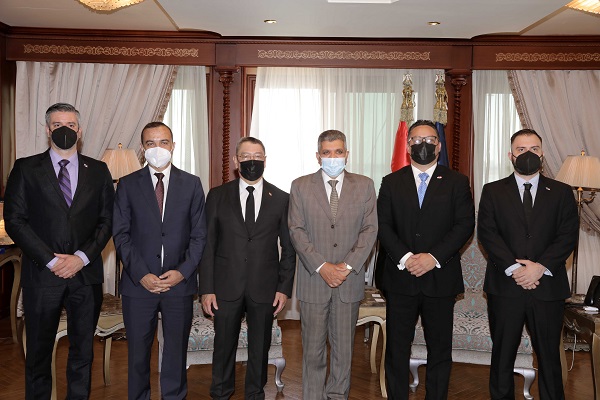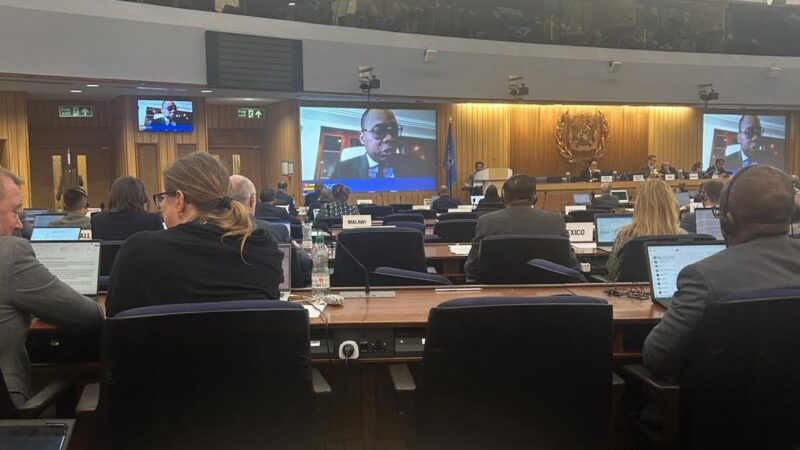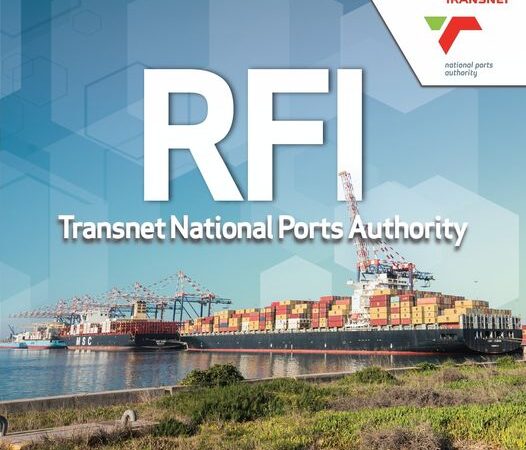Admiral Osama Rabie Receives the Panamanian Ambassador and the Director General of Panama Maritime Authority to discuss mutual cooperation
Rabie “We Are Keen to Keeping Our Extended Relations with the Ship-Owning Company Considering It One of the Major Suez Canal Clients, Negotiations Option Is Still on the Table”
Chairman and Managing Director of the Suez Canal Authority, Osama Rabie confirmed that the authority has assumed full responsibility in dealing with the grounding crisis of the of the Panamanian-flagged container ship “EVER GIVEN” since the incident took place, and has harnessed all its technical, human capabilities, equipment, and marine units it possesses to successfully complete the salvage operation with the participation of more than 600 members of the Authority’s staff as well as using 15 tugs, multiple diving and salvage units, service launches, and two dredgers belonging to the authority’s fleet of dredgers, as the authority has introduced the use of dredging in marine salvage operations, which is not common due to its requirement of high accuracy and adhering to the highest safety standards.
This was highlighted as his excellency received a high-level delegation headed by Ambassador Alejandro Gantes, the Panamanian Ambassador in Cairo accompanied by Mr. Rafael Cigarruista, Director General of the Panamanian Maritime Authority, to discuss ways of joint cooperation, at the Irshad (Guidance) Building in Ismailia Governorate.
At the onset of the visit, his excellency Osama Rabie welcomed the delegation to the Suez Canal Authority; expressing his appreciation for the extended relations of partnership with the Panama Canal, appreciating their constant endeavor to consolidate joint relations in order to serve the global trade movement.
For his part, Ambassador Alejandro Gantes, the Panamanian Ambassador in Cairo, praised the extended relations and fruitful cooperation with the Suez Canal Authority, appreciating the authority’s efforts to successfully complete the salvage of the Panamanian-flagged container ship.
Meanwhile, Mr. Rafael Cigarruista, Director General of the Panamanian Maritime Authority, expressed his desire to open new horizons for cooperation between the Panama Maritime Authority and the Suez Canal Authority by holding joint technical meetings to consult in various matters, on top of which is the completion of data related to the incident of the aground Panamanian-flagged container ship EVER GIVEN.
During the meeting, Rabie reviewed the Authority’s efforts in completing the salvage operation of the Panamanian-flagged container ship EVER GIVEN, clarifying that despite the success in refloating the Panamanian-flagged ship in record time within only six days and without any damage to the hull of the ship or the cargo on board, the ship-owning company did not show the due recognition deserved, which did not reflect an understanding of the huge losses incurred by the authority due to the incident, that can be seen in the damage to a number of participating marine units and the sinking of one of SCA marine units during the salvage operations, resulting in the death of one of the participants in the salvage operations, as well as the material and moral damages that the reputation of the Suez Canal has sustained by the suspension of navigation traffic, in addition to the counter campaign questioning SCA ability to solve the crisis and the tendency of some clients to take alternative routes during the crisis, estimated at 48 ships as well as the costs incurred by the Authority to combat pollution and treat 9 thousand tons of ballast water that was discharged to lighten the ship and facilitate its floatation.
Upon concluding the crisis successfully and refloating the vessel, the SCA managed to pursue its operations around the clock to accommodate 422 vessels in four days with an average of more than 100 transits per day, which resembled another challenge that the SCA has tackled successfully to serve the global trade and avoid further disruptions to the stability of global supply chains.
His excellency, Osama Rabie, continued “We relied on the principle of good intentions when dealing with the ship-owning company as we responded to their request not to take immediate legal measures, and we waited for eleven days during which we did not succeed in reaching an agreement commensurating with the losses we incurred, which forced us to resort to the court to legalize the status of the ship.”
His excellency stressed that the authority has spared no effort to make the negotiations with the company that owns the Panamanian-flagged container ship EVER GIVEN a success, as the authority agreed to all the submitted requests and we provided great payment facilities to the required compensation, and we also reduced the value of the required compensation by 40% from $ 916 million to $ 550 million dollars after we obtained the estimated financial value of the goods, as the ship-owners claimed that they did not possess such a statement, which forced us to estimate the initial value of the goods on board, the vessel itself, and the container shells at an estimated value in order to submit it to court fulfilling the legal procedures aimed at legalizing the situation of the ship. The total estimated value of the aforementioned items was a lump-sum of 2 billion USD, and based on that the compensation value was determined before the court at 916 million USD which was reduced later during the negotiations after the ship-owning company submitted a statement for the estimated value of the cargo on board.
According to these facilities, the value of the compensation requested by the Authority is about 550 million dollars, provided that 200 million USD shall be paid in advance, while the remaining 350 million USD are paid as letters of guarantee issued by an “A class” bank in Egypt, an offer that was not accepted by the company yet.
Rabie shed the light on the legitimacy of the Authority’s request for a salvage bonus as stipulated in Article 305 of the Egyptian Maritime Law No. 8 of 1990, which gives whoever performs any salvage work the right to receive a fair bonus, and the remuneration is determined according to the value of the ship and the value of the goods on-board. The salvage bonus is one of the elements of the compensation value demanded by the Authority, which also includes the costs of salvage work (operating the participating marine units, including tugs, dredgers, launches, cranes, excavators, winches, and others).
In accordance with this approach, the Authority remained flexible with regards to the negotiation procedures with the ship-owning company to maintain extended relations with it considering the ship-owning company as one of the major SCA clients, which explains the continuity of the negotiations to the moment, despite the ongoing litigation procedures to reach an agreement that suits all parties, despite the presence of many violations of the ship-owning company as it did not report the presence of dangerous flammable goods within the cargo on board, which would have had catastrophic consequences had the authority not dealt with it in an appropriate manner.
Admiral Rabie expressed his confidence in the rulings of the Egyptian judiciary, stressing that the authority resorted to litigation procedures for not reaching a joint agreement with the company that owns the ship so far about the value of compensation and not on the principle of the authority’s entitlement to compensation, pointing out in this regard that the authority has made the utmost effort to make the negotiations a success and dealt with full flexibility with all the requirements of the negotiation, and with what international norms recognized in this regard.
He stressed that the Suez Canal’s Book of Rules is the legal reference specified for the rights and obligations of the Suez Canal towards its clients. The book of rules includes the regulations of transit in the canal and all texts specific to the various responsibilities and requirements for the transit of ships in the canal, including marine, logistical, and salvage services.
The SCA chairman explained that the Canal’s book of rules stipulates that the ship or floating unit when sailing through the canal, bears responsibility for any consequential damage or loss that results directly or indirectly from the ship, the floating unit, or the Suez Canal Authority’s staff members.
He pointed out that the investigations of the of the Panamanian-flagged container ship EVER GIVEN incident had proven a mistake in directing the ship, which is the responsibility of the ship’s Master and not the Authority’s pilots, as their opinion is advisory and non-binding, and the owners and operators bear any damages that may befall the Authority, its property, others or the ship itself, complying with the provisions of the Egyptian Maritime Law No. 8 of 1990 in its articles from Article 282 to Article 290.
The SCA chairman stressed the invalidity of the allegations that the Authority is responsible for the occurrence of the incident as a result of allowing the vessel to transit the Canal under unfavorable circumstances, a claim that has nothing to do with the truth, as the navigation traffic in the Suez Canal runs normally even during the bad weather, which is what actually happened on the day of the incident as 12 vessels of the North-bound convoy transited before Panamanian-flagged container ship EVER GIVEN. On the same day, 30 vessels of the South-bound convoy anchored to wait in the Timsah lake and the Great Bitter Lakes area because of the incident, indicating in this regard that the Suez Canal is accustomed to the bad weather. The bad weather crisis that was in the month of March 2020 was the most difficult ever, and it did not result in any accidents or halting the navigation traffic in the Canal.
At the end of the visit, Admiral Rabie expressed the permanent readiness of the Suez Canal Authority to cooperate with all parties, whether through litigation procedures or negotiation procedures that are still continuing, hoping to resolve the conflict as soon as possible and by any means, explaining that the authority has no objection to responding to any requests of the ship-owning company of the Panamanian-flagged ship. Including the possibility of discharging the ship’s cargo into another ship or the procedures for changing crews (except for the captain of the ship being the judicial guard on it), commenting that such requests now fall within the jurisdiction of the competent court only, and the SCA cannot decide on the matter.
SCA




